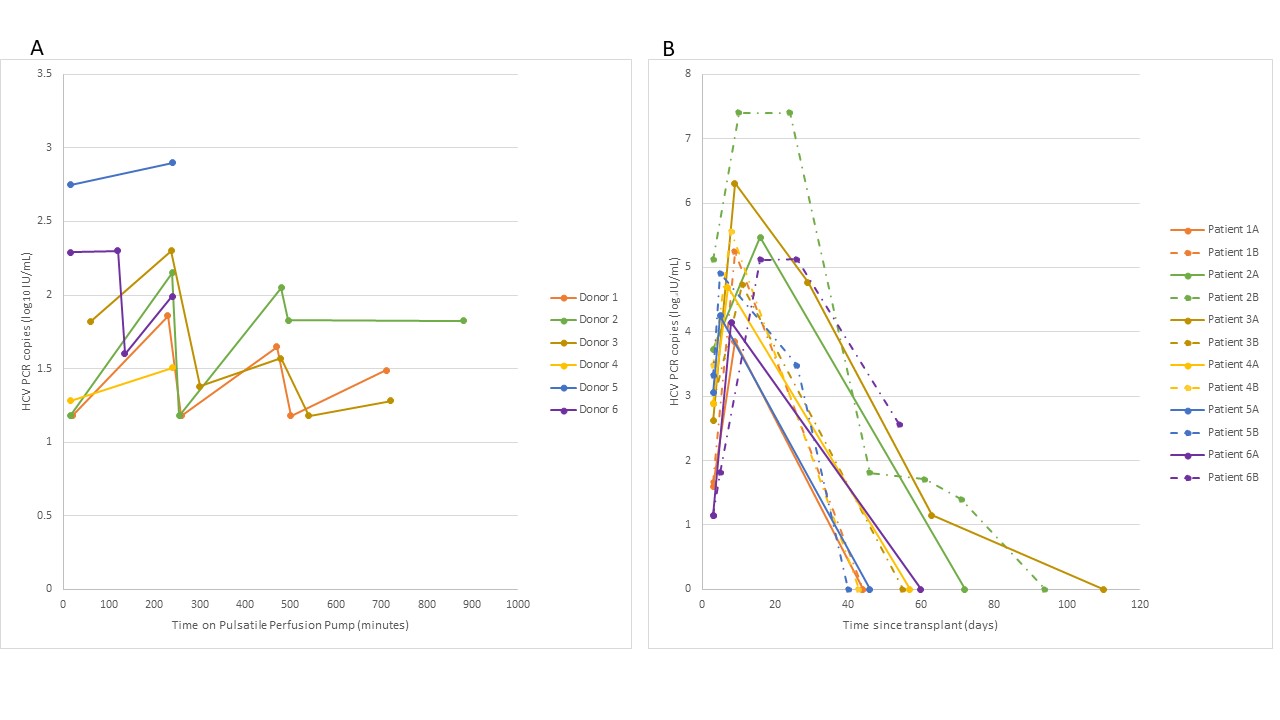The Effect of Pulsatile Pump Perfusion on Hepatitis C Viremia and Transmission in Kidney Transplantation: A Prospective Pilot Study
1Vanderbilt University Medical Center, Nashville, TN, 2Tennessee Donor Services, Nashville, TN
Meeting: 2020 American Transplant Congress
Abstract number: 71
Keywords: Hepatitis C, Kidney, Kidney transplantation, Preservation solutions
Session Information
Session Name: Deceased Donor Intervention and Management Research
Session Type: Oral Abstract Session
Date: Saturday, May 30, 2020
Session Time: 3:15pm-4:45pm
 Presentation Time: 3:51pm-4:03pm
Presentation Time: 3:51pm-4:03pm
Location: Virtual
*Purpose: With increasing utilization of hepatitis C (HCV) viremic donor organs for aviremic recipients, there may be a role for kidney pulsatile pump perfusion to decrease perfusate viral load over time to reduce HCV transmission.
*Methods: We performed a single center, prospective trial of HCV viremic donors for which our center was allocated both donor kidneys, thus creating transplant pairs, one of which was pumped with perfusate exchanges every 4 hours with viral load testing at least every 4 hours. Donor, recipient, and transplant characteristics as well as clinical outcomes were obtained. A linear regression was performed to quantify the association between pump time and perfusate viral load. Means (SD) were computed and the Wilcoxon signed rank test utilized to compare paired pumped vs unpumped recipients.
*Results: We included 6 HCV viremic donors for 6 pairs of aviremic recipients. The average time on the pump was 505 minutes (range: 240-880 minutes). Viral levels in the perfusate of the 6 pumped kidneys showed detectable virus throughout the pump cycles (Figure 1A). Although perfusate viral levels decreased with increasing pump times, this was not statistically significant (ß= -0.48, p=0.36). All recipients had detectable HCV RNA by postoperative day 3; the 6 recipients who had kidneys pumped had a mean viral load level less but not significantly than the unpumped recipient, 1,352±2,006 vs 26,170±61,211, p=0.09 (Figure 1B). The pumped patient cohort viral load (413,471±802,120) compared to unpumped (4,360,359±1.01e+07) cohort at 1 week was also not different, p=0.34. Mean±SD time to initiation of direct acting antiviral (DAA) was 32±12 vs 26±7 days (p=0.17) and mean±SD time to undetectable levels was 66±27 vs 55±22 days (p=0.82) for the pumped and unpumped cohorts, respectively. There were no episodes of delayed graft function with the mean±SD cold ischemia time being 1000 ±338 and 553±320 minutes (p=0.03) for the pumped and unpumped cohorts, respectively.
*Conclusions: A short course of pulsatile perfusion alone does not appear adequate to decrease HCV transmission. It may decrease the initial inoculum of HCV, however this seems clinically insignificant. Future studies should include additional ex-vivo interventions such as DAA- or methylene-blue infused perfusate while on the pump or treatment with ultraviolet light.
To cite this abstract in AMA style:
Forbes R, Concepcion B, Clapper D, Dubray B, Miller A, Shaffer D, Johnson K. The Effect of Pulsatile Pump Perfusion on Hepatitis C Viremia and Transmission in Kidney Transplantation: A Prospective Pilot Study [abstract]. Am J Transplant. 2020; 20 (suppl 3). https://atcmeetingabstracts.com/abstract/the-effect-of-pulsatile-pump-perfusion-on-hepatitis-c-viremia-and-transmission-in-kidney-transplantation-a-prospective-pilot-study/. Accessed February 26, 2026.« Back to 2020 American Transplant Congress

